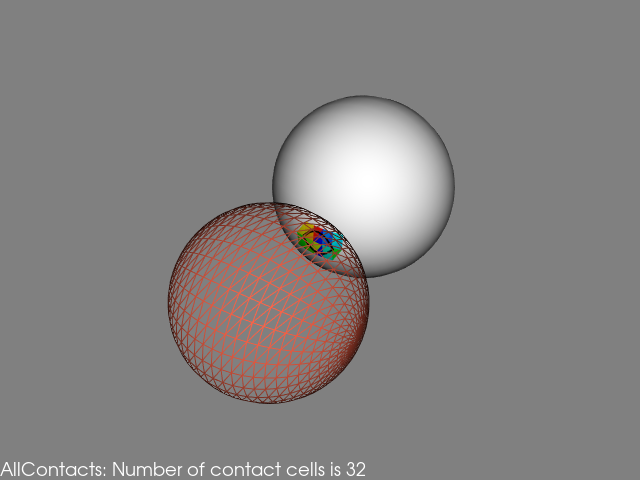CollisionDetection
Repository source: CollisionDetection
Description¶
This examples uses vtkCollisionDetectionFilter to find the intersection between a fixed (solid white) and moving (red wireframe) sphere. The animation places the moving sphere some distance from the fixed sphere and moves the moving sphere until it contacts the fixed sphere.
Three collision modes are available and can be set as the first argument on the command line.
- All contacts (0) finds all the contacting cell pairs with two points per collision.
- First contact (1) quickly find the first contact point.
- Half contacts (2) finds all the contacting cell pairs with one points per collision.
The animation pauses between each frame. The total animation should be 3 seconds.
Three videos on the VTK Examples Project youtube playlist show each of the collision modes.
Other languages
See (Cxx), (PythonicAPI)
Question
If you have a question about this example, please use the VTK Discourse Forum
Code¶
CollisionDetection.py
#!/usr/bin/env python
import time
# noinspection PyUnresolvedReferences
import vtkmodules.vtkInteractionStyle
# noinspection PyUnresolvedReferences
import vtkmodules.vtkRenderingFreeType
# noinspection PyUnresolvedReferences
import vtkmodules.vtkRenderingOpenGL2
from vtkmodules.vtkCommonColor import vtkNamedColors
from vtkmodules.vtkCommonMath import vtkMatrix4x4
from vtkmodules.vtkCommonTransforms import vtkTransform
from vtkmodules.vtkFiltersModeling import vtkCollisionDetectionFilter
from vtkmodules.vtkFiltersSources import vtkSphereSource
from vtkmodules.vtkRenderingCore import (
vtkActor,
vtkPolyDataMapper,
vtkRenderWindow,
vtkRenderWindowInteractor,
vtkRenderer,
vtkTextActor
)
def get_program_parameters():
import argparse
description = 'Collision detection.'
epilogue = '''
This examples uses vtkCollisionDetectionFilter to find the intersection between a
fixed (solid white) and moving (red wireframe) sphere.
The animation places the moving sphere some distance from the fixed sphere and
moves the moving sphere until it contacts the fixed sphere.
Three collision modes are available and can be set as the first argument on the command line.
1. All contacts (0) finds all the contacting cell pairs with two points per collision.
2. First contact (1) quickly find the first contact point.
3. Half contacts (2) finds all the contacting cell pairs with one points per collision.
'''
parser = argparse.ArgumentParser(description=description, epilog=epilogue,
formatter_class=argparse.RawDescriptionHelpFormatter)
parser.add_argument('contactMode', nargs='?', default=0, type=int, help='Contact mode 0 (default), 1, or 2.')
args = parser.parse_args()
return args.contactMode
def main():
contactMode = get_program_parameters()
# Define colors
colors = vtkNamedColors()
sphere0 = vtkSphereSource()
sphere0.SetRadius(0.29)
sphere0.SetPhiResolution(31)
sphere0.SetThetaResolution(31)
sphere0.SetCenter(0.0, 0, 0)
sphere1 = vtkSphereSource()
sphere1.SetPhiResolution(30)
sphere1.SetThetaResolution(30)
sphere1.SetRadius(0.3)
matrix1 = vtkMatrix4x4()
transform0 = vtkTransform()
collide = vtkCollisionDetectionFilter()
collide.SetInputConnection(0, sphere0.GetOutputPort())
collide.SetTransform(0, transform0)
collide.SetInputConnection(1, sphere1.GetOutputPort())
collide.SetMatrix(1, matrix1)
collide.SetBoxTolerance(0.0)
collide.SetCellTolerance(0.0)
collide.SetNumberOfCellsPerNode(2)
if contactMode == 0:
collide.SetCollisionModeToAllContacts()
elif contactMode == 1:
collide.SetCollisionModeToFirstContact()
else:
collide.SetCollisionModeToHalfContacts()
collide.GenerateScalarsOn()
# Visualize
mapper1 = vtkPolyDataMapper()
mapper1.SetInputConnection(collide.GetOutputPort(0))
mapper1.ScalarVisibilityOff()
actor1 = vtkActor()
actor1.SetMapper(mapper1)
actor1.GetProperty().BackfaceCullingOn()
actor1.SetUserTransform(transform0)
actor1.GetProperty().SetDiffuseColor(colors.GetColor3d("Tomato"))
actor1.GetProperty().SetRepresentationToWireframe()
mapper2 = vtkPolyDataMapper()
mapper2.SetInputConnection(collide.GetOutputPort(1))
actor2 = vtkActor()
actor2.SetMapper(mapper2)
actor2.GetProperty().BackfaceCullingOn()
actor2.SetUserMatrix(matrix1)
mapper3 = vtkPolyDataMapper()
mapper3.SetInputConnection(collide.GetContactsOutputPort())
mapper3.SetResolveCoincidentTopologyToPolygonOffset()
actor3 = vtkActor()
actor3.SetMapper(mapper3)
actor3.GetProperty().SetColor(colors.GetColor3d("Black"))
actor3.GetProperty().SetLineWidth(3.0)
txt = vtkTextActor()
txt.GetTextProperty().SetFontSize(18)
renderer = vtkRenderer()
renderer.UseHiddenLineRemovalOn()
renderer.AddActor(actor1)
renderer.AddActor(actor2)
renderer.AddActor(actor3)
renderer.AddActor(txt)
renderer.SetBackground(colors.GetColor3d("Gray"))
renderer.UseHiddenLineRemovalOn()
renderWindow = vtkRenderWindow()
renderWindow.SetSize(640, 480)
renderWindow.AddRenderer(renderer)
interactor = vtkRenderWindowInteractor()
interactor.SetRenderWindow(renderWindow)
# Move the first object
numSteps = 100
dx = 1.0 / float(numSteps) * 2.0
transform0.Translate(-numSteps * dx - .3, 0.0, 0.0)
renderWindow.Render()
renderer.GetActiveCamera().Azimuth(-60)
renderer.GetActiveCamera().Elevation(45)
renderer.GetActiveCamera().Dolly(1.2)
renderWindow.SetWindowName('CollisionDetection')
renderWindow.Render()
for i in range(0, numSteps):
transform0.Translate(dx, 0.0, 0.0)
renderer.ResetCameraClippingRange()
s = '{:s}: Number of contact cells is {:d}'.format(collide.GetCollisionModeAsString(),
collide.GetNumberOfContacts())
txt.SetInput(s)
renderWindow.Render()
if collide.GetNumberOfContacts() > 0:
break
# The total animation time is 3 seconds
time.sleep(3.0 / numSteps)
renderer.ResetCamera()
renderWindow.Render()
renderWindow.Render()
interactor.Start()
# In Field Data there will be an array named "ContactCells".
# This array indexes contacting cells (e.g.) index 10 of array 0
# points to a cell (triangle) which contacts/intersects a cell
# at index 10 of array 1.
# You can directly obtain these, see GetContactCells(int i)
# in the documentation.
# print(collide.GetOutput(0))
# print(collide.GetOutput(1))
if __name__ == '__main__':
main()
